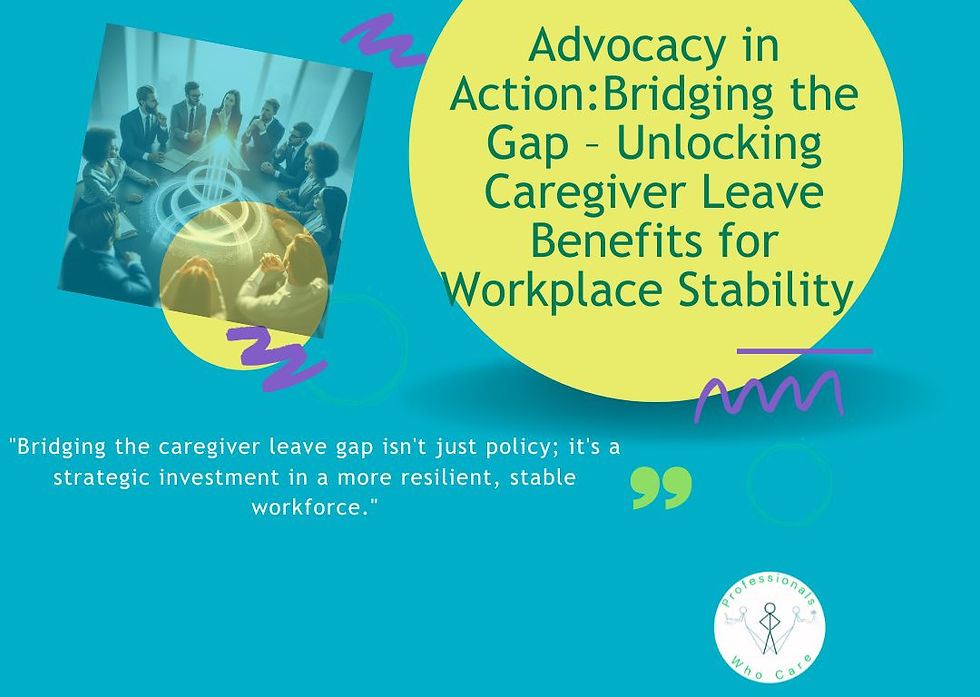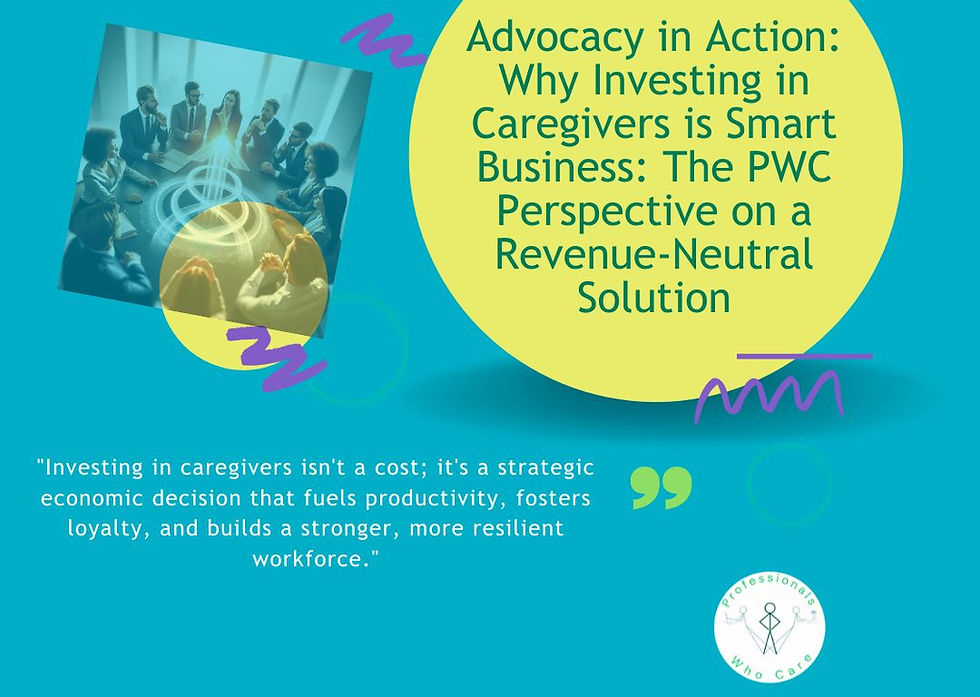Advocacy in Action: Bridging the Gap – Unlocking Caregiver Leave Benefits for Workplace Stability
- Mark Fukae
- Jul 27
- 4 min read

By Mark Fukae, Director of Advocacy, Professionals Who Care. Founder, CASI - Caregiver Advocacy and Support Initiative.
In the intricate dance of refining critical legislation like the Colorado and Federal CARE Acts, a stark reality emerged: despite robust programs designed to support working caregivers, utilization remains surprisingly low. This disconnect points to a deeper issue beyond just eligibility or affordability. It highlights how perceived workplace penalties - the fear of retaliation and discrimination - are subtly undermining initiatives like the Family and Medical Leave Act (FMLA) and Colorado’s paid Family and Medical Leave Insurance (FAMLI) program. Indeed, as highlighted in Hidden Truths: #9 (which I will post soon!), there are limited protections for employed caregivers which directly contributes to this very issue.
FMLA & FAMLI: Designed for Support, Facing Underutilization
Both FMLA and FAMLI represent significant strides in supporting employees who balance work with caregiving responsibilities. FMLA offers job-protected, albeit often unpaid, leave for qualified employees nationwide. Colorado's FAMLI builds on this by providing paid, job-protected leave. These policies are designed to prevent career-family trade-offs, yet a significant gap exists between who is eligible and who actually uses these benefits.
The Data Disconnect: Eligibility vs. Actual Use
Consider these figures:
Approximately 15.3% of the U.S. workforce takes FMLA-qualifying leave annually, despite its availability for over 30 years.
Only 52% of U.S. workers meet FMLA's eligibility criteria, and just 39% can afford six weeks of unpaid leave without falling into poverty.
In Colorado, despite FAMLI offering paid leave, early reports indicate utilization in 2024 fell below projected capacity. Anecdotal evidence suggests particularly low engagement for intermittent family-caregiving leave.
This underutilization isn't just a missed opportunity for caregivers; it represents a tangible cost to businesses. When caregivers cannot access or are afraid to utilize leave, it contributes to increased absenteeism, higher turnover rates, and reduced productivity - all factors that directly impact a company's bottom line. Employers nationally already face billions in losses annually due to caregiver-related work interruptions.
The Invisible Cost: Fear and Stigma
Why the reluctance to use available benefits? Data points to a pervasive culture of fear and stigma. A SHRM survey revealed that only one-third of senior executives strongly agreed extended leave had no adverse career impact, signaling that real or perceived penalties for using leave are widespread. Common deterrents include:
Fear of retaliation, demotion, or stalled career progression.
Uncertainty about workload coverage and manager support.
Lack of awareness or misconceptions about rights under FMLA/FAMLI.
This fear, often rooted in concerns about "associational discrimination" (where an employee faces bias due to their connection with someone with a disability), is a silent drain on workplace stability and talent retention. Businesses lose valuable employees who feel they must choose between their jobs and their family responsibilities.
The Business Imperative for Change: How the CARE Acts Lead the Way
Addressing the underlying fear and stigma isn't just about employee well-being; it's a strategic imperative for businesses aiming for stability and growth. The Colorado and Federal CARE Acts directly tackle these issues, offering solutions that benefit both employees and employers:
Explicit Protections & Anti-Retaliation: By codifying associational-disability protections and strengthening anti-retaliation language, the CARE Acts reduce the perceived risks for employees. This clarity can significantly boost caregiver confidence in utilizing leave and accommodations, leading to improved retention and reduced absenteeism.
Normalizing Leave & Accommodations: The acts promote cultural shifts through measures like supervisor training to normalize leave-taking and remote-work accommodations. For businesses, this means managers are better equipped to support employees, fostering loyalty and a more engaged workforce.
Boosting Productivity & Retention: When employees feel supported and secure in their caregiving roles, they are more productive and less likely to leave. The CARE Acts, by making accommodations like telework more accessible (e.g., Colorado's "Telework Presumption"), help businesses retain skilled talent, reducing costly recruitment and training expenses.
Awareness Campaigns: The acts support awareness campaigns that highlight caregiver success stories and rights, helping to dismantle misconceptions and foster a workplace culture that views caregiving support as a strength, not a burden.
By actively addressing the cultural and legal barriers that fuel fear, these legislative efforts aim to unlock the full potential of caregiver leave benefits. This will not only boost FAMLI and FMLA engagement but also provide a model for best practices nationwide, leading to more resilient, productive, and stable workplaces for all.
Your Voice Matters. Take Action! The pervasive discrimination faced by caregivers, particularly those in disadvantaged groups, represents a critical challenge to building truly inclusive and productive workplaces. Your engagement is essential to bridging this understanding gap and advocating for policies that support our diverse workforce. Every share, every comment, every moment of engagement contributes to a future where workplaces genuinely work for everyone.
Share Your Story: Have you experienced the fallout of caregiver discrimination or distant policy? Share your story with us at https://www.professionalswhocare.org/your-story/. We’re amplifying voices that can truly close the gap.
Learn more about Professionals Who Care (PWC) and our mission: https://www.professionalswhocare.org/
Discover the Caregiver Advocacy and Support Initiative (CASI): https://casiadvocacy.org/
Explore the details of the Colorado CARE Act: https://casiadvocacy.org/our-legislative-solutions/
Understand the impact of the Federal CARE Act: https://casiadvocacy.org/our-legislative-solutions/
Join our growing movement and sign our petition: https://chng.it/zHbMzKnBwJ
Let’s keep the conversation going: Share your thoughts in the comments on how policies have impacted your life or the lives of those you care for.




Comments